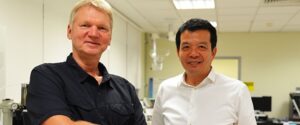Noise Cancelling Device by NTU Scientists Halves Noise Pollution Through Open Windows

Nanyang Technological University, Singapore (NTU Singapore) researchers have developed a device that can reduce noise pollution entering buildings even while windows are wide open.
Noise Cancelling Device
Designed to be mounted onto window grilles, the device could reduce up to 50 per cent of noise coming from nearby environments such as busy roads, train tracks or from construction activities.
The Noise Cancelling Device uses ‘active noise control’ technology – found in many high-end headphones that cancels external noise – that is adapted to work in a large open area.
The benefits are two-fold: windows can be left open for fresh air without disturbance from external noise pollution and reducing the need for air-conditioning to keep the interiors of buildings and homes cool.
Professor Gan Woon Seng, Director for NTU’s Centre for Infocomm Technology (INFINITUS), who led the research said, “Compared to noise cancellation headphones, what we have achieved is far more technically challenging as we needed to control the noise in a large open area, instead of just around the ear.
This noise cancellation technology is an example of research innovations that NTU is encouraging under its Smart Campus initiative, which aims to improve quality of life for society through the development of new sustainable and technological solutions and by trialling them on its campus first.
Using sound to remove noise
Currently at the prototype stage, the device uses 8 watts of power, similar to a small portable Bluetooth speaker. Several units are placed together to form a grid-like array on a window grille to reduce external noise.
The device uses a special sound emitting mechanism which works like a speaker and is hooked up to a processing unit. Equipped with a microphone, it can detect noise even before it reaches the window and computes the attributes of the incoming noise in real-time.
It quickly emits a countering sound or “anti-noise” that has the same waveform characteristics of the invading noise but with one difference: it is inverted or “flipped”.
When both outside noise and anti-noise converge, they cancel each other out, resulting in a softer ambient sound entering living spaces.
“Our innovation not only computes the right amount and type of “anti-noise” to emit, but also does it faster than the detected noise can reach inside the building,” explained Prof Gan, who teaches at NTU’s School of Electrical & Electronic Engineering.
The research team conducted the tests using a soundproof chamber at the university’s labs that houses a mock room with windows and doors, resembling a typical room in a home. Various recorded sounds from construction sites, jet engines and trains were used as noise sources during the tests.
They are now developing the technology further by improving its noise cancellation efficiency, making them smaller, and more cost-effective to produce.
Prof Gan said, “We are currently finding ways to improve the technology further so that it can be used not only at window grilles with large openings, but also provide a cost-effective solution that can be easily installed and replaced. Ultimately, we aim to integrate this technology into window grilles that can help mitigate urban noise pollution conveniently.”
The researchers are also working with government agencies in Singapore to further improve the technology to make it viable for commercial and residential applications.
The project was jointly developed with the University of Southampton in the United Kingdom, and Tottori University in Japan.
It is supported by Singapore’s Ministry of National Development and the National Research Foundation in the Prime Minister’s Office, under the ‘Land and Liveability National Innovation Challenge’ (L2 NIC) Research Programme.
The initiative seeks to leverage R&D to develop innovative technological solutions to increase Singapore’s land capacity for its long-term development needs and provide tech-based options for future generations.
About Nanyang Technological University
A research-intensive public university, Nanyang Technological University, Singapore (NTU Singapore) has 33,500 undergraduate and postgraduate students in the colleges of Engineering, Business, Science, Humanities, Arts, & Social Sciences, and its Interdisciplinary Graduate School. It also has a medical school, the Lee Kong Chian School of Medicine, set up jointly with Imperial College London.













